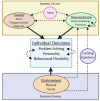Problem Solving in Animals: Proposal for an Ontogenetic Perspective
- PMID: 33803609
- PMCID: PMC8002912
- DOI: 10.3390/ani11030866
Problem Solving in Animals: Proposal for an Ontogenetic Perspective
Abstract
Problem solving, the act of overcoming an obstacle to obtain an incentive, has been studied in a wide variety of taxa, and is often based on simple strategies such as trial-and-error learning, instead of higher-order cognitive processes, such as insight. There are large variations in problem solving abilities between species, populations and individuals, and this variation could arise due to differences in development, and other intrinsic (genetic, neuroendocrine and aging) and extrinsic (environmental) factors. However, experimental studies investigating the ontogeny of problem solving are lacking. Here, we provide a comprehensive review of problem solving from an ontogenetic perspective. The focus is to highlight aspects of problem solving that have been overlooked in the current literature, and highlight why developmental influences of problem-solving ability are particularly important avenues for future investigation. We argue that the ultimate outcome of solving a problem is underpinned by interacting cognitive, physiological and behavioural components, all of which are affected by ontogenetic factors. We emphasise that, due to the large number of confounding ontogenetic influences, an individual-centric approach is important for a full understanding of the development of problem solving.
Keywords: behavioural flexibility; cognition; development; individual; innovation; ontogeny.
Conflict of interest statement
The authors declare no conflict of interest.
Figures
References
-
- Rymer T.L., Pillay N., Schradin C. Extinction or survival? Behavioral flexibility in response to environmental change in the African striped mouse Rhabdomys. Sustainability. 2013;5:163–186. doi: 10.3390/su5010163. - DOI
-
- Lambert M.L., Jacobs I., Osvath M., von Bayern A.M. Birds of a feather? Parrot and corvid cognition compared. Behaviour. 2019;156:505–594. doi: 10.1163/1568539X-00003527. - DOI
Publication types
Grants and funding
LinkOut - more resources
Full Text Sources
Other Literature Sources
Medical


